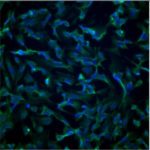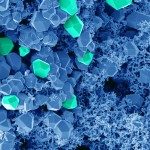Epigenetics defines when and where genes are expressed. Epigenetic marks are reversible and inheritable, integrate the impact of the environment and provide cellular plasticity. Aberrant epigenetic patterns are involved in tumor formation, maintenance and resistance. Notably, epigenetic modifications can be modified by chemical agents. In this context, we developed an original approach at the interface of Chemistry and Biology to identify new inhibitors of DNA methylation. We have successfully used several chemical strategies (rational drug design, pharmacomodulation, chemical library screening) and set up biological assays to characterize the cellular consequences induced by these inhibitors in cancer cells. Our findings encouraged us about the role of DNA methylation in tumor aggressiveness and the ability of epigenetic drugs to reprogram cancer cells.
The Research Unit dedicated to Epigenetic Chemical Biology (EpiChBio) focus on
- the design of chemical molecules targeting DNA and histone methylation,
- their use as probes to scan the molecular process that deregulate these modifications in cancer and
- their use as potential therapeutic agents to reprogram gene regulation in cancer cells.
A precise elucidation of why the methylation processes is aberrant in cancer is the key to a better understanding of the disease and to fight it. The understanding of these processes will open the way to the discovery of novel anti-cancer targets, eventually also biomarkers, and innovative therapeutic strategies.
The project objective is the design, the preparation and the use of chemical inhibitors of the methylation modifications as probes of the whole process. The attention will focus in particular on cancer aggressiveness and resistance. This strategy will be validated in metastatic melanoma, very aggressive tumors showing highly invasive and chemoresistant features that could be reversed by epigenetic reprogramming.
This interdisciplinary approach combines Medicinal Chemistry, Pharmacology, Molecular Biology, Biophysics, Chemical Biology and Cellular Biology.








